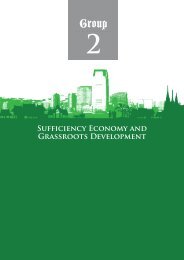Conflict, Legitimacy and Government Reform: Equitable Allocation of ...
Conflict, Legitimacy and Government Reform: Equitable Allocation of ...
Conflict, Legitimacy and Government Reform: Equitable Allocation of ...
Create successful ePaper yourself
Turn your PDF publications into a flip-book with our unique Google optimized e-Paper software.
72 KPI Congress XI<br />
The second way <strong>of</strong> how public policies in Thail<strong>and</strong> are formed is<br />
through pressure (gently but with stern face) <strong>of</strong> interest groups backed by<br />
capitalist groups <strong>and</strong> businesses, including numerous business<br />
associations, brokers <strong>of</strong> the stock market, stock exchange board, major<br />
stock investors, some university scholars who have some shared interests<br />
with the above groups. Moreover, the stuff considered academic in<br />
Thail<strong>and</strong> merely rests on secular views <strong>of</strong> the above groups. So, no matter<br />
whether academics are a hired shooter or not a hired shooter, most <strong>of</strong><br />
them will shoot in the same directions or their shots will be cluttered<br />
together.<br />
This pressure may be considered forceful. Despite the fact that this<br />
pressure may not be based on a comprehensive study, shining “scholar’s<br />
aura” is there. Thus, it has a great influence on media <strong>and</strong> audiences, let<br />
alone financial connection between these groups <strong>and</strong> politicians in every<br />
party. So, this pressure becomes the most vital factor in the formulation<br />
<strong>of</strong> public policies. At the least, if these policies are not opposed by these<br />
groups, they will likely be implemented.<br />
The third way <strong>of</strong> how public policies are formed is through the<br />
monarchy. Due to a special status <strong>of</strong> this institution in the Thai society,<br />
the king’s opinions greatly influence the formulation <strong>of</strong> public policies.<br />
(That’s all I want to write about this because that’s all the courage I have)<br />
The fourth way <strong>of</strong> how public policies are formed is through<br />
middle-class people, who are the most important customers <strong>of</strong> all types<br />
<strong>of</strong> media because <strong>of</strong> high purchasing power that can make the media<br />
pr<strong>of</strong>itable. Actually, these people don’t have much shared interests, except<br />
some basic necessities. So, this is the group <strong>of</strong> people that have power to<br />
influence public policies to a certain extent. Since politicians typically<br />
seek popularity among voters, there is a tendency that they will propose<br />
policies to appease middle classes, for example, capping cooking gas<br />
price, taking money from benzene to subsidize diesel prices, reducing bus<br />
fare, building expressway, reducing expressway toll fee, increasing<br />
deductibles for personal income tax <strong>and</strong> so forth.














